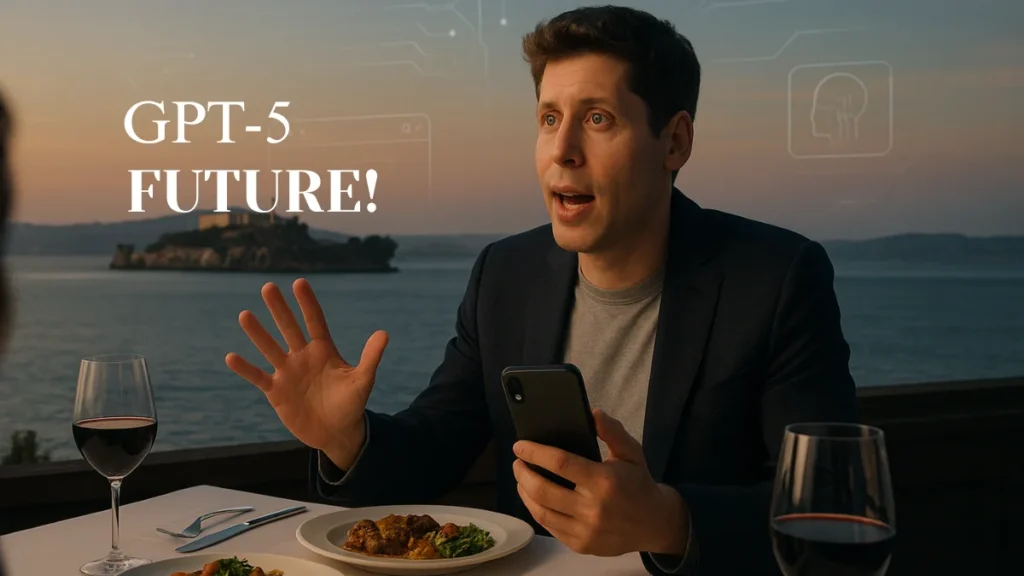Sam Altman wants the world to know OpenAI isn’t just about GPT-5.
Over Mediterranean plates in San Francisco, the OpenAI CEO sketched an ambitious future — from browsers and brain chips to consumer apps — even as his latest flagship AI model faced a lukewarm reception.
Key Takeaways
- Sam Altman says OpenAI is moving beyond GPT-5 toward consumer apps.
- Incoming exec Fidji Simo may oversee AI browser and social projects.
- OpenAI exploring brain–computer interface investments to rival Neuralink.
- GPT-5 rollout stumbled but API traffic doubled within 48 hours.
- Altman signals OpenAI could one day mirror Alphabet’s broad scope.
OpenAI CEO Sam Altman told reporters that GPT-5’s mixed launch won’t define the company’s future. Instead, OpenAI is focusing on new consumer apps, an AI-powered browser, and brain–computer interface investments — moves that suggest Altman is steering the company toward becoming a broad tech platform rather than just a chatbot maker.
Altman Looks Past GPT-5 at San Francisco Dinner
When OpenAI CEO Sam Altman invited a dozen reporters to a dinner overlooking San Francisco Bay, GPT-5 should have been the star. Instead, the evening revealed something bigger: a company preparing to outgrow its signature chatbot.
Altman, casually brandishing an uncased iPhone, joked about aesthetics before shifting to serious talk. “We’re going to ship a device so beautiful that if you put a case over it, I’ll personally hunt you down,” he quipped, hinting at OpenAI’s forthcoming hardware collaboration with Apple design veteran Jony Ive.
But the meal wasn’t about aesthetics. It was about making clear that GPT-5, while still central, is no longer the company’s sole identity.
A Shift From Models to Markets
Unlike GPT-4, which stunned the industry in 2023, GPT-5 has been met with tempered reactions. Users complained about its tone and functionality, forcing OpenAI to reinstate GPT-4o and the model picker.
Altman and VP of ChatGPT Nick Turley acknowledged the rocky rollout. “I legitimately just thought we screwed that up,” Altman admitted, noting mistakes like removing GPT-4o without warning. Turley added that updates are rolling out to make GPT-5’s responses “warmer” while still avoiding sycophantic behavior.
Yet OpenAI executives stressed that models alone no longer define the company. COO Brad Lightcap and incoming applications head Fidji Simo are preparing a slate of products that extend well beyond ChatGPT.
Consumer Apps on the Horizon
Fidji Simo, currently CEO of Instacart, is set to join OpenAI to lead new consumer initiatives. Altman suggested these could include an AI-powered browser and even a social media platform — areas ripe for disruption.
“There’s nothing inspiring about how AI is used on social media today,” Altman said. “I want to see if it’s possible to build a much cooler kind of social experience with AI.”
He even entertained the idea of acquiring Google Chrome if it were ever for sale. “If Chrome is really going to sell, we should take a look at it,” Altman said with a half-smile.
Brain Chips and Bold Bets
Beyond apps, Altman confirmed OpenAI’s interest in brain–computer interfaces. The company is considering backing Merge Labs, a startup competing with Elon Musk’s Neuralink. “We have not done that deal yet; I would like us to,” Altman said.
If finalized, such a move would mark OpenAI’s expansion into frontier biotech, raising new questions about safety and integration with AI models.
GPT-5’s Paradox: Criticism Meets Record Demand
Despite mixed reviews, GPT-5 has not slowed adoption. Altman revealed API traffic doubled within 48 hours of launch, with coding assistants like Cursor quickly making GPT-5 their default engine.
That paradox — disappointment alongside record usage — reflects OpenAI’s unusual position: both heavily scrutinized and massively in demand.
Human reactions mirror the divide. One Bay Area developer at the dinner said GPT-5 felt “blunt and robotic” at first, but after tweaks, “it’s starting to feel more like a partner again.”
Why It Matters
OpenAI’s pivot suggests the company doesn’t want to be trapped by ChatGPT’s success. With growing competition from Google, Anthropic, and startups, Altman’s strategy signals a transformation into a broader tech ecosystem — potentially mirroring Google’s parent Alphabet.
What’s Next
- Fidji Simo to launch consumer apps under OpenAI in coming months.
- Updates rolling out to make GPT-5 “warmer” in tone.
- Potential investment in Merge Labs for brain–computer interfaces.
- Speculation rises that OpenAI may pursue an IPO to fund expansion.
